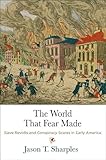The World That Fear Made : Slave Revolts and Conspiracy Scares in Early America / Jason T. Sharples.
Material type: TextSeries: Early American StudiesPublisher: Philadelphia : University of Pennsylvania Press, [2020]Copyright date: ©2020Description: 1 online resource (365 p.) : 27 illusContent type:
TextSeries: Early American StudiesPublisher: Philadelphia : University of Pennsylvania Press, [2020]Copyright date: ©2020Description: 1 online resource (365 p.) : 27 illusContent type: - 9780812252194
- 9780812297102
- Slave insurrections -- Caribbean Area -- History -- 17th century
- Slave insurrections -- Caribbean Area -- History -- 18th century
- Slave insurrections -- United States -- History -- 17th century
- Slave insurrections -- United States -- History -- 18th century
- HISTORY / United States / Colonial Period (1600-1775)
- African Studies
- African-American Studies
- American History
- American Studies
- 306.3/62097309032 23
- E441 .S527 2020
- online - DeGruyter
| Item type | Current library | Call number | URL | Status | Notes | Barcode | |
|---|---|---|---|---|---|---|---|
 eBook
eBook
|
Biblioteca "Angelicum" Pont. Univ. S.Tommaso d'Aquino Nuvola online | online - DeGruyter (Browse shelf(Opens below)) | Online access | Not for loan (Accesso limitato) | Accesso per gli utenti autorizzati / Access for authorized users | (dgr)9780812297102 |
Browsing Biblioteca "Angelicum" Pont. Univ. S.Tommaso d'Aquino shelves, Shelving location: Nuvola online Close shelf browser (Hides shelf browser)

|

|

|

|

|

|

|
||
| online - DeGruyter Scholarship, Money, and Prose : Behind the Scenes at an Academic Journal / | online - DeGruyter Street Commerce : Creating Vibrant Urban Sidewalks / | online - DeGruyter Your Whole Life : Beyond Childhood and Adulthood / / | online - DeGruyter The World That Fear Made : Slave Revolts and Conspiracy Scares in Early America / | online - DeGruyter Landscapes of Law : Practicing Sovereignty in Transnational Terrain / | online - DeGruyter Cookbook Politics / / | online - DeGruyter Sovereignty Suspended : Building the So-Called State / |
Frontmatter -- CONTENTS -- INTRODUCTION. The Cup of Wrath Is Almost Full -- CHAPTER 1. Making Sense of Strangers -- CHAPTER 2. Studying the Horizon -- CHAPTER 3. Seeking Truth Through Terror -- CHAPTER 4. The Risk of Relations -- CHAPTER 5. The Accountants, the Opportunists, and the Rebels -- CHAPTER 6. Governing in a World of Fear -- EPILOGUE. The Transforming Fires of the Haitian Revolution -- APPENDIX -- NOTES -- INDEX -- ACKNOWLEDGMENTS
restricted access online access with authorization star
http://purl.org/coar/access_right/c_16ec
A thought-provoking history of slaveholders' fear of the people they enslaved and its consequencesFrom the Stono Rebellion in 1739 to the Haitian Revolution of 1791 to Nat Turner's Rebellion in 1831, slave insurrections have been understood as emblematic rejections of enslavement, the most powerful and, perhaps, the only way for slaves to successfully challenge the brutal system they endured. In The World That Fear Made, Jason T. Sharples orients the mirror to those in power who were preoccupied with their exposure to insurrection. Because enslavers in British North America and the Caribbean methodically terrorized slaves and anticipated just vengeance, colonial officials consolidated their regime around the dread of rebellion. As Sharples shows through a comprehensive data set, colonial officials launched investigations into dubious rumors of planned revolts twice as often as actual slave uprisings occurred. In most of these cases, magistrates believed they had discovered plans for insurrection, coordinated by a network of enslaved men, just in time to avert the uprising. Their crackdowns, known as conspiracy scares, could last for weeks and involve hundreds of suspects. They sometimes brought the execution or banishment of dozens of slaves at a time, and loss and heartbreak many times over.Mining archival records, Sharples shows how colonists from New York to Barbados tortured slaves to solicit confessions of baroque plots that were strikingly consistent across places and periods. Informants claimed that conspirators took direction from foreign agents; timed alleged rebellions for a holiday such as Easter; planned to set fires that would make it easier to ambush white people in the confusion; and coordinated the uprising with European or Native American invasion forces. Yet, as Sharples demonstrates, these scripted accounts rarely resembled what enslaved rebels actually did when they took up arms. Ultimately, he argues, conspiracy scares locked colonists and slaves into a cycle of terror that bound American society together through shared racial fear.
Mode of access: Internet via World Wide Web.
In English.
Description based on online resource; title from PDF title page (publisher's Web site, viewed 27. Jan 2023)


